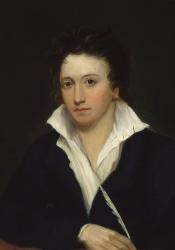The Life and Work of Percy Bysshe Shelley
["Chapter 5", pp. 261] In Virginia Woolf’s Orlando, the name Shelley is dropped in “Chapter 6” while Orlando and Shelmerdine are enjoying their married life: “…Orlando was lying in the bracken, while Shelmerdine recited Shelley (whose entire works he had by heart)…” (Woolf 261). Mary and Percy Shelley were both writers during their lives, but context clues of Shelmerdine memorizing the work hints that Woolf intended to mean Percy, who was known for his poetry as opposed to Mary who was known for her novels.
Percy Bysshe Shelley (1792-1822) was the eldest son of six children within the affluent Shelley family. His higher education included Eton College, which he did not enjoy, in 1804 and then attending University College, Oxford in 1810. However, Shelley published a series of anonymous political poems that resulted in his expulsion from Oxford in 1811 (“Percy Bysshe Shelley").
As for his personal life, Shelley married Harriet Westbrook in 1810, but their relationship grew estranged, leading to a secret courtship with Mary Godwin in 1814. Shortly after Harriet’s death, Godwin and Shelley eloped in France, but they ran into financial trouble that forced them to reluctantly return to England.
To get by, the couple moved in with a suspected lover of Shelley’s, Claire Clairmont, because both he and Mary were proponents of a “free love” that discouraged sexual chastity (“Mary Wollstonecraft Shelley”)
In 1822 after settling in Italy, Shelley ventured out on his boat, the Don Juan, which was caught in a storm and resulted in his death. He left behind six children and a widowed Mary Shelley, who continued to pursue writing to support her family.
Shelley’s work often held politically charged elements that desired for society to adopt republicanism and reform parliament to give voice to the people. In addition to his progressive views, Shelley advocated for nonviolence in political activism. His most influential political work is his poem Queen Mab (1813), which also touched on his atheist beliefs; however, Shelley did not believe in the prosecution of any religious beliefs (“Percy Bysshe Shelley").
As for his legacy, Shelley left behind many incomplete works and most of it was poorly reviewed because of the political messages within his poetry. He is best known for his works Ozymandias (1818), Ode to the West Wind (1819), and To a Skylark (1820).
With the content of the greater novel in mind, Woolf ties the Romantic motifs associated with Shelley’s work with Orlando’s themes of impermanence and cultural change. (393)
Work Cited:
Clint, Alfred. “Percy Bysshe Shelley.” Wikimedia Commons, https://commons.wikimedia.org/w/index.php?search=Percy+Shelley&title=Spe....
“Mary Wollstonecraft Shelley.” Poetry Foundation, Poetry Foundation, https://www.poetryfoundation.org/poets/mary-wollstonecraft-shelley.
“Percy Bysshe Shelley.” Poetry Foundation, Poetry Foundation, https://www.poetryfoundation.org/poets/percy-bysshe-shelley.
Woolf, Virginia. “Chapter 5.” Orlando: A Biography, Mariner Books, Boston, 2022, p. 227-62.

